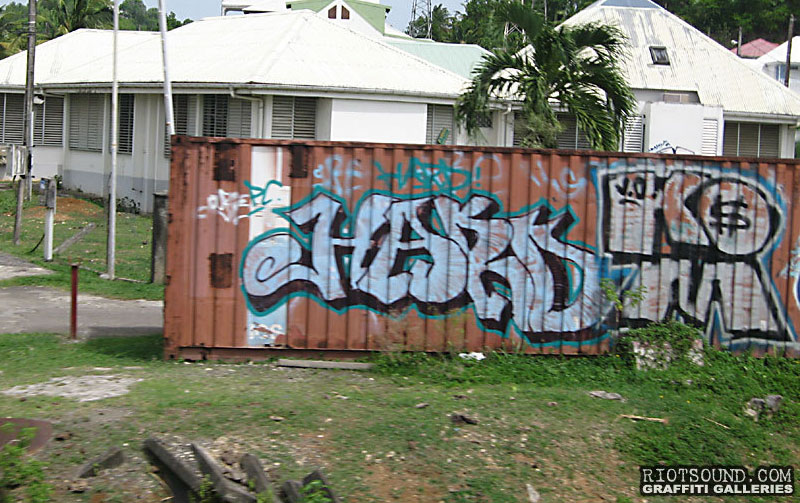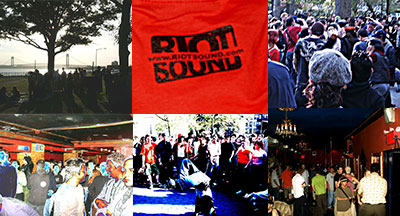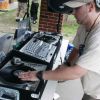by Alex Shtaerman
It’s been almost a decade since acclaimed filmmaker Marc Levin brought us face to face with gang violence in America’s heartland. Gang War: Bangin’ In Little Rock first aired on HBO in 1994 earning the CableACE Award for Best Documentary that same year and subsequently becoming one of the most widely watched documentaries in the network’s history. This August the producers of Gang War return to Little Rock a decade removed and reacquaint themselves with some of the gang members featured in the original film.
Back In The Hood: Gang War 2 (which debuts Thursday, August 26th on HBO 10:00-11:00 pm E.T.) follows Leifel Jackson, the former leader of the Original Gangster Crips, as he is released from federal prison after serving more than seven years for drug trafficking. Jackson was one of the targets in a 1993 drive-by shooting captured on film in the original Gang War documentary. But this sequel has a twist. Rather than go back to his old ways, the former Crip is now determined to make a difference in the community. Now 41, Leifel runs Our Club, a government funded youth violence prevention program dedicated to mentoring at-risk youth.
While Leifel has made a remarkable transition from gang leader to community activist, youth advocate and motivational speaker, he continues to face serious challenges in everyday life. Even though the city government honored him with the Juvenile Justice Worker Of The Year Award, Leifel is not on the city’s payroll and struggles working odd jobs to provide for his family. Despite the fact that over one hundred young people are enrolled in Our Club, Leifel still has no health insurance.
But through it all Leifel is undaunted by the odds against him and determined to stay on the right path. “I’m committed to living my life as an example that you can come home regardless of how long you’ve been gone and still make it. Anyone can make a change and everyone can make a difference. When it comes to giving, I think there’s a greater obligation on the people fortunate enough to overcome the streets, to give back to the hood. I’ve done a lot out in the streets and to my community, now I’m trying to put something better in the hood”.
RIOTSOUND.COM: This may be an ignorant question, but I think a lot of people may want to know this. How did the gangs in Little Rock, Arkansas become Bloods and Crips? How do the Bloods and Crips end up having chapters all across the country – what is it about those two?
LEIFEL JACKSON: Well, I don’t think the Bloods and Crips were the first gangs in Little Rock. I think the impact the Bloods and the Crips have coming from the west coast is that its dealing with money. Money and power and territory; unlike some other gangs, in order to become a Blood or a Crip you have to take an initiation and you have to have territory. So when you first come into a community you draw the lines and say – this is my territory. So when those lines are drawn, that causes tension and there may be a lot of murders, a lot of robberies, a lot of violence and loss of life.
RIOTSOUND.COM: From your experience, what do you feel are some of the main reasons that young people gravitate to gangs and the gang lifestyle?
LEIFEL JACKSON: A lot of times it’s the environment but there are other reasons. Some of the other reasons are love, respect, just a place to be sometimes; a place you want to be. Talking about myself as an example, my father once told me that it wasn’t right for a man to hug another man. So when I was in Southern California and I’d seen a Crip hug another Crip, that just blew me out of the water. So there are a lot of different reasons.
RIOTSOUND.COM: In the film we see police officers refer to the gang members as terrorists. However, as you watch the police go about their work, they look more like terrorists than do the gang members. You can’t help but get the impression that we are waging a war against ourselves. Aside from law enforcement, shouldn’t we be sending in counselors to work with these kids?
LEIFEL JACKSON: I think if you become too personal with anything you become just as bad. And as shown, a lot of the police officers become too personal in their work; so they become the terrorists. Any kid who has had the opportunity to see someone get shot, see someone robbed and killed, they would definitely need counseling. That’s just like going off to war and coming back from war. A person who goes to war and sees someone shot down, they need some type of counseling because they are ill. So when it comes to saying that these kids are all functioning and they are just terrorists, a lot of these kids are sick, need counseling and need some help. So once again the police officers, with a lot of them, I am not going to say all of them, but a lot of them become just what they take an oath to fight.
RIOTSOUND.COM: Over the past year you have been trying to counsel young kids and create the type of programs that would help in turning the community around and you have also won many awards for your efforts. Yet when it comes to funding, you have very few resources. Why do you think the authorities in Little Rock would rather spend millions of dollars on bolstering their police force as opposed to putting at least a few thousand dollars into programs like yours?
LEIFEL JACKSON: Well, I think a lot has to do with image. If you take money away from law enforcement and put it towards a program organized by a former gang member; as far as image, they don’t want to cross that line. They don’t want to be seen communicating with terrorists. But in this world we find there is a lot of communication between people who have done wrong things in order to make them better. Of course, a lot of the money that is spent on law enforcement would work better if some of it were spent on certain community rehabilitation programs.
RIOTSOUND.COM: How successful do you feel you’ve been in turning peoples’ lives around? Given your efforts as one person, how much of a positive impact do you feel you’ve had in this community?
LEIFEL JACKSON: Well, with me, I’ve learned that sometimes you just can’t take one person at a time and deal with them. It’s like taking one cat from the family. You can take that one cat and clean that cat up and take all the flees off of it, but in the evening that cat still has to go back home to the family and each kitten in the family still has fleas. So I take the holistic approach and I deal with the whole family and I can say that I have had a big effect on a lot of lives and a lot of families and the entire community with the work that I have been doing here at Sherman Park, Our Club and abroad.
RIOTSOUND.COM: In the film there is a scene where a former Bloods member comes in to talk to the kids in one of your programs and I couldn’t help noticing that he was wearing all red and you were also wearing blue. Is it significant or irrelevant that you are still wearing your colors even though you yourself have moved on?
LEIFEL JACKSON: I think that it’s definitely both. I wear the colors, those were my colors and I wear them. Regardless of what I do those are the colors that I wore and I don’t think it’s a crime that these are the colors that I usually like to wear. I also by the same token respect that a Blood who wears red, those are the colors that they wear and I respect that and have no ill feeling in my heart toward them for that.
RIOTSOUND.COM: It seems that rather than condemning the gangs entirely, which is all the government has ever done, you focus more on just facilitating positive change in the community. How does that work?
LEIFEL JACKSON: I don’t believe that you need to go out and take a kid or a grownup who has been involved in gangs all their life and tell them – hey, you got to condemn the gangs and leave it alone and then maybe you can become part of this society. I think you have to go out and encourage the kids to start doing positive things and not only will that kid have an effect on himself but he’ll have an effect on everyone that used to hang around him. They’ll say – look at so and so there, he used be with us hanging out all the time, now look at him – he’s the assistant to the mayor. So I think the positive impact that a person has when they go out and do positive things is what helps create change.
RIOTSOUND.COM: Even though you are doing all these things that are gaining recognition, you still have trouble getting a regular job due to your criminal record. It seems like a vicious cycle the government has created. We incarcerate so many young black males and then put them back into a world with virtually no employment opportunities. What else are they to do but go back to crime?
LEIFEL JACKSON: I feel that it is definitely a vicious cycle. The majority of young African American males that come back out of prison are faced with so many odds. If you can’t feed your daughter or your son and you don’t know nothing else but to sell drugs, you’re going to sell drugs. If you don’t know anything else but robbing, you going to rob. If banging was your thing, you’re going to bang. Sometimes I look at some of the youth who come out and want to do the right thing – the first thing they say is – I need to get a job. Of course, I hate seeing that because it’s even hard for me to get a job. So when they can’t get a job you see them a couple of weeks later and there they are, back on the corner. So my heart pours out to them but I don’t look down on them at all; I look down on society for not creating resources for them. In every job application you fill out it asks you – are you a felon? Let one company tell you that does not play a big part in whether you are hired or not. Yes or no?
RIOTSOUND.COM: At what point did you decide you were going to do what you are doing now? Was it during the time you were incarcerated or was it prior to that?
LEIFEL JACKSON: Even when I was out on the street doing my worst, I was trying to create a safe heaven for kids and do things in the community. It’s just that I was so deeply entrenched in drug trafficking that I couldn’t get out of that. So I wanted to make changes and do things before I went to prison. Prison disconnected me with the drug trafficking part, which gave me an opportunity to think more and to focus more on the things I wanted to do. So I think my change came before I went to prison and I was able to make the transition while I was in prison.
RIOTSOUND.COM: What is your ultimate goal with your programs? If somebody gave you $10 million and said – spend it any way you want to; how would you spend that money or how would you start spending it?
LEIFEL JACKSON: I would start by spending that money one community at a time. Sometimes we take our money and we try to spread it too thin. I’m a believer that you have to focus on one place and make a difference and then you can move on. So I would probably start with the center that I am at and try to expand it and continue to make a difference here and send some of these kids to college and then move on and grow bigger.
RIOTSOUND.COM: You still have a lot of family that is a part of the gang lifestyle. Is it important for you to reach them with what you are doing or is it harder for you to have that type of influence since they know what you have done in your own life?
LEIFEL JACKSON: I think the hardest part was when I first came home, to walk the walk and talk the talk. Now I am seeing a big change in not only my family and my kids who were raised by the streets and who were full blown gang members, but also in their friends and a lot of the other young men who are starting to take on a whole new, totally different outlook. I am also seeing Bloods and Crips who would have never had an opportunity to be together, who were family members; and now I am starting to see them together. So I think maybe the positive role that I am playing is having an effect on them also.
RIOTSOUND.COM: Compared to what we saw in the first film Gang War: Bangin’ In Little Rock – how is it different today than it was in 1994?
LEIFEL JACKSON: Ten years ago we were trying to create territory. We wanted this block to be 23rd, this block to be OGC, then we had Oak Street. So we were really fighting over territory. Now that the territory has already been marked off, you’ll know when you ride through certain communities, there may not be no sign but you’ll know this is OGC. So in that way it’s calmer now since territories have been established.
RIOTSOUND.COM: Right now there are a lot of suburban white kids in America who have money and have families but still feel a need to emulate the gang lifestyle because they might think having guns and selling drugs is the cool thing to do. How is that situation similar or different to what you are dealing with?
LEIFEL JACKSON: Well, I would say the white suburban kids are probably some of the most likely to gravitate to gangs. But I think the impact that gangs have on suburban white kids is that they feel they have to make a big statement because the Crips and the Bloods have been around for a while. So they feel they have to come out and show that they are no punks either, so they have to do something outrageous to get our attention. Now, with that said, you have to look at the Columbines of this world and situations where kids go in to shoot other kids in schools. That makes a statement. They’re saying – we’re no punks just ’cause we’re white – we can do this too. So we have to be mindful that when a kid is reaching out, regardless of what color he is, you have to be there for them.
RIOTSOUND.COM: What would your message be to young people who may be reading this?
LEIFEL JACKSON: I guess my message would be to look at me as not an angel. Sometimes people tend to think with the work I do – oh, he’s an angel. No. I am a person who lived a life and I’ve had a change. And with my change I feel I can make a difference and I am just trying to make that difference. And I think that everybody, every human as long as they’re breathing can make a difference. Right now I know one of the original Crips from California, one of the original members who started it all, he’s trying to make a change but he’s on death row. I guess my message would be – you don’t have to be on death row before you decide to make a change.






























Comments